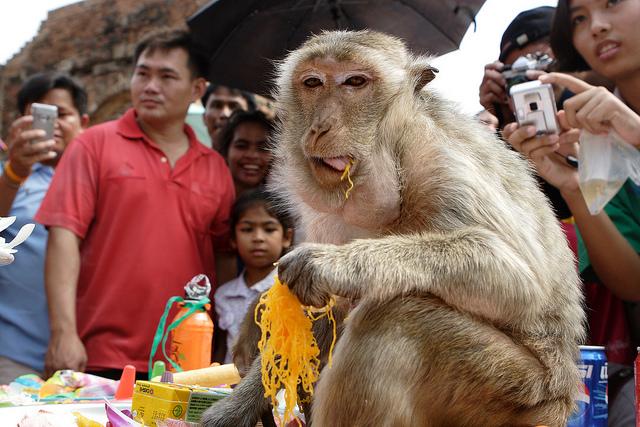Histories across Species
About this collection

Long-tailed macaque monkeys are offered food during the annual Monkey Buffet Festival at the Pra Prang Sam Yot temple in the city of Lopburi, Thailand. The festival gathers thousands of monkeys and visitors and is today a major international tourism event.
Long-tailed macaque monkeys are offered food during the annual Monkey Buffet Festival at the Pra Prang Sam Yot temple in the city of Lopburi, Thailand. The festival gathers thousands of monkeys and visitors and is today a major international tourism event.
Photograph by nate2b, 25 November 2006.
Accessed via Flickr on 25 February 2019. Click here to view source.
 This work is licensed under a Creative Commons Attribution-NonCommercial-NoDerivs 2.0 Generic License.
This work is licensed under a Creative Commons Attribution-NonCommercial-NoDerivs 2.0 Generic License.
Over the last decade, the study of non-human animals has grown at the intersection of several academic fields. Although the social and historical study of animals has expanded, the question about how to effectively engage narratives of human and non-human agencies and (in)justice has remained. This unresolved question has heightened tensions and hindered further dialogue among scholars in these disciplines. This has been particularly evident in areas around the world where human and civil rights movements are still ongoing processes and accounts about animals seem divorced from needed contemporary social and political actions.
This collection explores epistemological, ethical, techno-scientific, and socio-political aspects in the study of non-human animals across species. We particularly welcome contributions that address the tensions between human and non-human agencies within socio-ecological issues in a particular place and time, but that offer insights into broader processes of change.
Some of the topics addressed may include, but are not restricted to:
Animal rights, human rights, and environmental policy • Farming and livestock production • De-extinction sciences and technologies • Animal sciences, testing, and cognition • Synthetic biology, biodiversity, and co-evolution • Wildlife and ecological conservation • Animals, race, and environmental justice issues • Machine learning and AI in ecosystem management • Multispecies relations • Hunting and poaching • Zoos and animal exhibitions • Human-wildlife conflicts • Breeding and domestication • Animal representations, education, and game development • Wildlife corridors and biophilic design • Animal robotics in ecological research • Microbiology, marine ecology, and outer space environments.
The collection is curated by William San Martín (Worcester Polytechnic Institute, USA).

